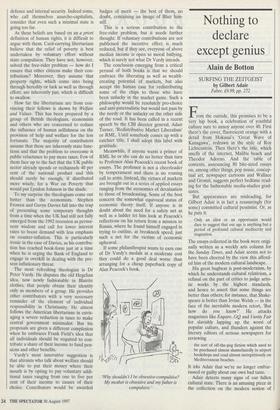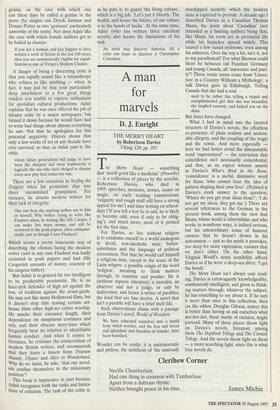Nothing to declare except genius
Main de Botton
SURFING THE ZEITGEIST by Gilbert Adair Faber, £9.99, pp. 272 Fora the outside, this promises to be a very hip book, a celebration of youthful culture sure to annoy anyone over 40. First there's the cover, fluorescent orange with a detail from Hokusai's 'Great Wave of Kanagawa', redrawn in the style of Roy Lichtenstein. Then there's the title, which smells of the internet, Malibu beach and Theodor Adorno. And the table of contents, announcing 80 bite-sized essays on, among other things, pop music, concep- tual art, newspaper cartoons and Wallace and Gromit, suggests perfect bedtime read- ing for the fashionable media-studies grad- uates.
But appearances are misleading, for Gilbert Adair is in fact a reassuringly (for some) committed cultural pessimist. Or, as he puts it:
Only an idiot or an opportunist would dare to suggest that our age is anything but a period of profound cultural mediocrity and stagnation.
The essays collected in the book were origi- nally written as a weekly arts column for the Sunday Times, and Adair seems not to have been cheered by the view this afford- ed him of the modern cultural landscape.
His great bugbear is post-modernism, by which he understands cultural relativism, a refusal on the part of critics to judge artis- tic works by the highest standards, and hence to assert that some things are better than others; for instance, that Shake- speare is better than Irvine Welsh — in the face of the inevitable modern retort, 'But how do you know?' He attacks magazines like Esquire, GQ and Vanity Fair for slavishly lapping up the worst of popular culture, and thunders against the literary editors of serious newspapers for reviewing
the sort of off-the-peg fiction which used to be purchased almost shamefacedly in airport bookshops and read almost surreptitiously on Mediterranean beaches.
It irks Adair that we're no longer embar- rassed or guilty about our own bad taste.
Adair detects many signs of our fallen cultural state. There is an amusing piece in the collection on the modern notion of genius, on the ease with which one can these days be called a genius in the press (he singles out Derek Jarman and Dennis Potter as two 'geniuses' particularly unworthy of the term). Nor does Adair like the ease with which female authors get to be hailed as classics:
If you are a woman, and you happen to have written a work of fiction in the last 100 years, then you are automatically eligible for repub- lication as one of Virago's Modern Classics.
A danger of being a discerning critic is that you rapidly sound like a misanthrope who refuses to like anything — when, in fact, it may just be that your particularly deep attachment to a few great things renders you unable to express enthusiasm for quotidian cultural productions. Adair explains that he was once offered the job of theatre critic by a major newspaper, but turned it down because he would have had to write bad things about almost everything he saw. Not that he apologises for this potential negativity. History shows that only a few works of art of any decade have ever survived, so that, as Adair puts it, the critic
whom future generations will judge to have been the sharpest and most trustworthy is logically the one who feels obliged to dismiss every new play that comes his way.
There are a few occasions in Surfing the Zeitgeist when his pessimism slips into sheer unexamined grumpiness. For instance, he attacks modern writers for their lack of integrity: One can hear the aspiring author say to him or herself: Why bother trying to write like Flaubert when, by writing like Jilly Cooper, I can make lots more money and still be reviewed in the posh papers, often enthusias- tically, just as though I were Flaubert?
Which seems a pretty inaccurate way of describing the choices facing the modern writer (and in any case Flaubert was badly reviewed in posh papers and had Jilly Cooperish amounts of money, courtesy of his surgeon father). But Adair is in general far too intelligent to be predictably pessimistic. He is no knee-jerk defender of high art against the low, of tradition against the avant-garde. He may not like many Hollywood films, but it doesn't stop him teasing certain art- house films other high-art critics worship. He mocks their excessive length, their dependence on sumptuous costumes and sets, and their obscure story-lines which frequently bear no relation to identifiable human conduct. And when it comes to literature, he criticises the conservatism of modern British writers, and recommends that they learn a lesson from Tristram Shandy, Ulysses and Alice in Wonderland. Why do we insist, he asks, 'that our novel- ists confine themselves to the missionary position'?
This book is impressive in part because Adair recognises both the tasks and limita- tions of criticism. The task of the critic is, as he puts it, to guard 'the living culture', which is a big job. 'Let's put it bluntly. The health, and hence the future, of our culture is in the hands of hacks.' At the same time, Adair (who has written three excellent novels) also knows the limitations of his task:
An artist may discover America. All a critic can hope to discover is Christopher Columbus.



















































 Previous page
Previous page